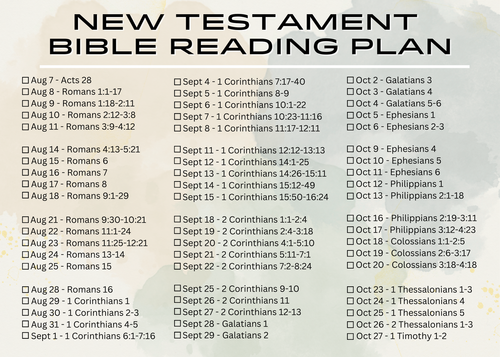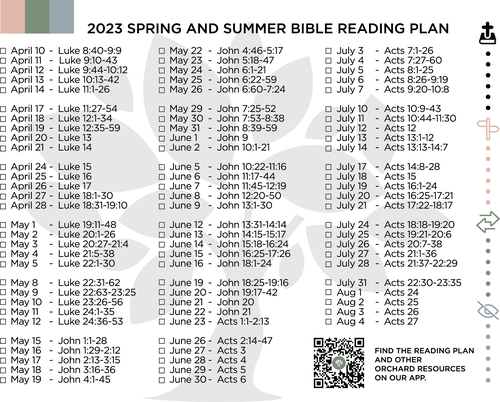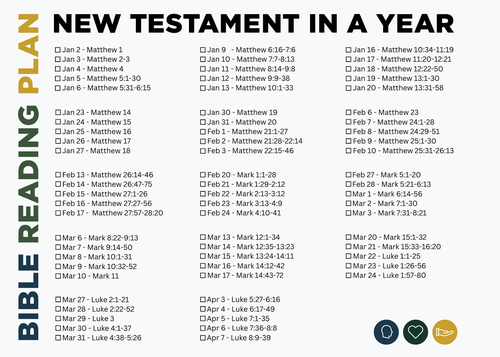Are These Things So?
Acts 7:1-26
Hear Me
The speech by Stephen is the longest one in Acts, and a straightforward question prompted it, "Are these things so?" However, instead of answering with a simple "yes" or "no" or defending himself against his accusers, Stephen delves into a thorough analysis of Israel's history, starting from Abraham up to the killing of Jesus. During his speech, Stephen highlights how the Law and Prophets were directed toward Christ.
Abraham And The Promise
The message discusses how God chose Abraham and called him to leave his homeland and journey to the land of Canaan. Despite Abraham not receiving any inheritance from God in that land, he was promised a future for himself and his descendants. This promise became the foundation for the rest of Israel's history. Although God promised Abraham his descendants would receive land, it took four hundred years, and his children endured slavery before the promise was fulfilled. However, God eventually saved them, judged their captors, and brought them to the land where they could worship him. As a symbol of this covenant, God gave Abraham the sign of circumcision, which became a mark of the people of God.
Stephen that section of his address by confirming that God fulfilled his promise to Abraham, who had a son named Isaac and received the covenant sign. Isaac later became the father of Jacob, who had twelve sons that became the fathers of the twelve tribes of Israel. Therefore, while God's call and promise to Abraham began the story of Israel, it continued through his descendants.
Stephen that section of his address by confirming that God fulfilled his promise to Abraham, who had a son named Isaac and received the covenant sign. Isaac later became the father of Jacob, who had twelve sons that became the fathers of the twelve tribes of Israel. Therefore, while God's call and promise to Abraham began the story of Israel, it continued through his descendants.
Jealous Of Joseph
The story of Joseph starts with a betrayal: his brothers sold him into slavery (Acts 7:9). This event marks the beginning of Israel's history of unfaithfulness, a recurring theme in Stephen's speech. The following verses briefly mention Joseph's famous words to his brothers. However, when Joseph ended up in Egypt, he received God's favor and became prosperous. Approximately seventy of Abraham's descendants migrated to Egypt. Despite not being in the Promised Land, they multiplied and eventually became a nation. The clear conclusion from this part of Stephen's address regarding Joseph is that all the patriarchs, including Jacob, die while they are outside the land, meaning that the narrative of the promise continues.
Beautiful In God's Sight
Stephen's narrative about Moses starts with reference to persecution, similar to what happened to Joseph. The situation worsened as the Egyptian king decided to eliminate Israel's babies by abandoning them (v.19). Just like in Acts, salvation followed persecution, which came about through the birth of Moses. Stephen highlights that Moses was safeguarded for three months, and he goes on to describe how Pharaoh's daughter saved him and his education in Egypt. Stephen uses the incident where Moses kills an Egyptian who beat an Israelite to illustrate the tense relationship between Moses and the Israelites from the start. In the Exodus version, an Israelite challenges Moses the day after he kills the Egyptian, saying, "Who made you a ruler and judge over us? Do you plan to kill me as you did the Egyptian?" Notably, Stephen mentions that Moses believed the Israelites would realize that God was using him to bring them salvation.





Recent
Archive
2023
January
Happy New Year!He Will Save His People From Their SinsMy Beloved SonTemptation And MinistryThe SermonLeaving, Lying, Limits, Love, Largesse, and The Lord's PrayerTreasure, Anxiety, and JudgmentAstonishing AuthorityStorms, Demons, and HealingJesus Is CompassionateHis Eye Is On The SparrowSwords, Rewards, and MessengersThe Lord of the SabbathBlasphemy, Bad Trees, Signs, and FamilyStories, Sowers, and SoilsParables, Hidden Treasure, and RejectionFame, Food, Fear, Faith, and FringeReal Issues And The Power Of GodDying To Find LifeLike The SunChildren, Temptation, Sheep, And ForgivenessMarriage, Kids, And MoneyTo Serve And Give His Life
February
The ArrivalStories That StingQuestion TrapsHidden Motives And LamentThe End...?UnexpectedReady?Punishment, The Plot, And PerfumeTreachery, Passover, and The CupBetrayal, Injustice, And DenialThe Field Of Blood And The GovernorCrucifixion And DeathAll AuthorityMark—The Beginning Of The GospelHealing, Preaching, And The Forgiveness Of SinEating With Tax Collectors, Fasting, The Sabbath, And An Escape BoatThe Twelve, Blasphemy, Family, And A ParableParables And PowerA Different Kind Of StormPower Had Gone Out
March
Death, Hunger, And MiraclesCommandment Or TraditionDo You Not Yet Understand?The Christ And A Glimpse Of His GloryUnbelief, Confusion, And SinDivorce, Children, And PossessionsTo Give His Life As A RansomHosannaThe Rejected Stone, Taxes, And The Great CommandmentDestruction And The EndNo One Knows, An Anointing, And A Promise To BetrayPassover And GethsemaneThe Kiss, Arrest, And DenialPilate, Simon, And The CrucifixionDeath, Burial, Resurrection, And What\'s NextTheophilus And A Visit From GabrielMary And The MagnificatBenedictusThe Arrival And The ShepherdsSimeon, Anna, And The SpiritFruits Keeping With Repentance And BaptismThe Wilderness, Nazareth, And CapernaumSimon's Mother-In-Law, Fishing, A Leper, And Sins
April
Tax Collectors, Fasting, Sabbath Controversies, And The TwelveWhy Do You Call Me Lord, Lord?Jesus Marveled, A Raised Son, And QuestionsA Sinful Woman And A ParableObeying The Word, A Storm, And DemonsTwelve Years, Twelve Apostles, And SpeculationGreater, Costly, And GloryNot Getting It, The Cost, And AppointedWoes, Neighbors, And What Is NecessaryHelp Us Pray And A Divided Kingdom?Signs, Lights, And WoesHypocrisy, Fear, A Fool, And AnxietyParables, Division, And The TimesWarnings, A Daughter Of Abraham, And Jerusalem, JerusalemA Son Or An Ox, Parties, And DiscipleshipLost ThingsThe Dishonest Manager, The Law, And Anguish In This FlameMillstones And Mustard SeedsPersistent Prayer, Humility, A Childlike Faith, And The Rich RulerEverything That Is Written, A Blind Beggar, And A Wee Little Man
May
A Parable, A Colt, A Prophecy, And A CleansingAuthority, Wicked Tenants, And TaxesThings To Beware Of And WidowsDestruction, Persecution, The Son Of Man, And WatchingThe Plot, Betrayal, Lord's Supper, And Inappropriate BehaviorPrediction, Fulfillment, Agony, Betrayal, And DenialMistreated, Taken Before The Council, Pilate, Herod, And Delivered To Be CrucifiedCrucifixion, Death, And BurialHe Is Not HereDisbelieved For JoyIn The Beginning…The Lamb Of God And A WeddingZeal, What's Inside, And Born AgainHe Must Increase
Categories
no categories
Tags
no tags
